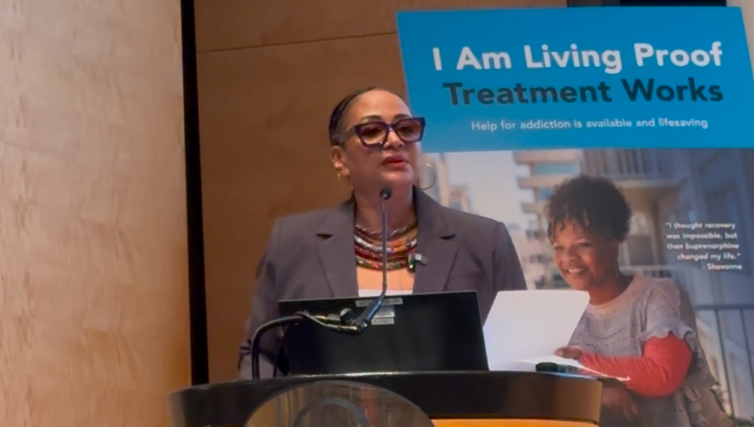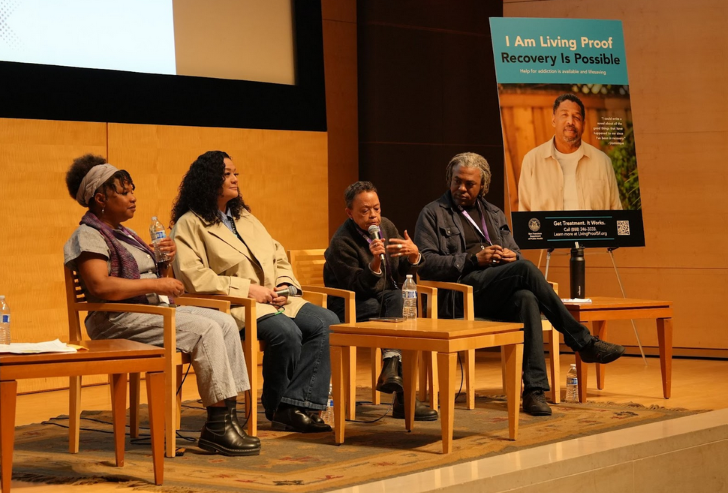
Black community leaders, nonprofit and service workers, and workers for San Francisco’s Department of Public Health all came together last week for “Unity in Community: Overdose Prevention Summit 2025.”
This summit was the culmination of monthly meetings between the Coordinated Overdose Response and Engagement (CORE) arm of DPH and Black leaders in the recovery field across San Francisco. Black leaders recommended the summit to DPH to elevate visibility for the issue of disproportionate Black overdose deaths. The Black community felt a keen sense of urgency about these racial disparities, and we’re proud of GLIDE’s Policy Associate Shiba Bandeeba for all she did to move plans for the summit forward.
Newly elected Mayor Daniel Lurie, who has made a “Fentanyl State of Emergency Ordinance,” a signature piece of legislation for his new administration, briefly stopped by to kick off the summit. His speech emphasized the importance of listening to Black leaders and to those who are closest to the problem. Public Health Director Dr. Grant Colfax gave an enthusiastic speech about community’s role in inspiring the government, pointing out that the successful HIV prevention efforts began as a result of community demands.
How a Loving Approach, That Puts Services and Housing First, Can Reduce the Racial Overdose Disparity
Then GLIDE’s President and CEO Dr. Gina Fromer took the stage, opening with a powerful story about how community ambassadors save people from dying from overdoses. “Fifteen lives have been saved by GLIDE alone,” she said, before praising and shouting out other ambassador groups in the audience. “To support a person, we have to support their community. No one is going through this alone, okay? No one!” she told the audience.
And you can be a part of that community of support! There is an amazing group of GLIDE community members constantly advocating for the needs of our low-income communities with marches, phone banks, letters and more. You can sign up to join those social justice warriors here, or you can sign up for an opportunity to serve those in need here at glide.org/volunteer.
Dr. Fromer also shared a heartfelt story about the painfulness of waiting for loved ones who struggle with substance use to make a choice to turn around their lives. “But when they’re ready, we have to be ready,” she added, emphasizing the importance of making services available and accessible. “But we join them on the journey, we don’t chastise them for not getting to their final destination on the day they start!”
The audience cheered hard when Dr. Fromer made her point about how housing prevents substance abuse. “We need more permanent supportive housing and affordable housing! We need to all work together to prevent overdoses in housing – including with tenant-led peer support programs. Housing helps prevent substance use!” she emphasized.
Do’s and Don’ts for Practitioners and Policymakers Supporting Recovery from Substance Use
GLIDE’s Health Programs Manager Janet Ector spoke on a panel alongside Shavonne Allen, a lead artist in Skywatchers (a Tenderloin group that fights addiction and builds community with artistic expression), Executive Director of Code Tenderloin Donna Hilliard, and Maurice Byrd, an LMFT from Harm Reduction Therapy Center. Facilitating the panel was Richard Beal, the Director of Recovery Services at Tenderloin Housing Clinic. Janet Ector received tumultuous applause when she made the point, “Carceral solutions are not the answer.”

Maurice Byrd spoke about the importance of developing relationships with people in recovery, “Without relationships, you accomplish nothing.” He criticized scare-based drug education tactics in schools, pointing out that giving students misleading information can erode their trust. He also highlighted the need for more Black therapists and more therapists trained on the ins and outs of addiction.
Donna Hilliard talked about the importance of “listening without giving answers,” and giving employment opportunities to people in recovery. Shavonne Allen shared a story about being hospitalized while using substances, and being persuaded by the caring attitude of her doctor that it was worth trying a treatment program. Everyone on the panel agreed that honest caring professionals who establish relationships need to be compensated fairly. Low wages contribute to burnout, and the least we can do for people on the frontlines is give them the resources they need to succeed.
Ultimately, the enemy is not substances: the enemy is the isolation and hardship that drive people towards using substances as a coping mechanism. The panel ended with the memorable quote, “Every saint has a past, and every sinner has a future.”
Sometimes the difference between the people we admire and the people we look down on is just the point they are at in their lives! That’s why the values of radical inclusion and unconditional love we hold at GLIDE are so important. Through the lens of inclusion and love, we can see a person as their best possibilities, not their worst moments.
